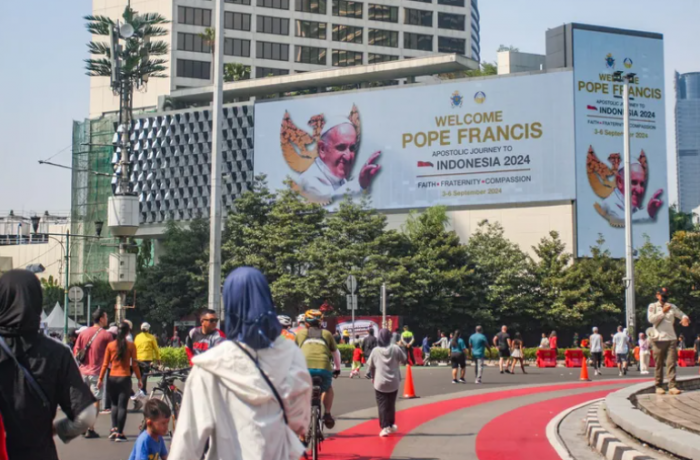The pontiff left Rome on the long flight to Jakarta. Tomorrow he will arrive at the nunciature; on Wednesday morning, he will be officially welcomed at the Presidential Palace. For President Joko Widodo, Francis is a “top figure” with whom he will discuss global issues, like Ukraine and Gaza”. Much hope is placed in the meeting with the Grand Imam Nazaruddin Umar with whom the pontiff will sign a joint declaration after walking through the tunnel that connects the capital’s main mosque to the Catholic cathedral.
Jakarta (AsiaNews) – Pope Francis left Rome this afternoon on his apostolic journey to Asia and Oceania, which will last until 13 September, taking him to Indonesia, Papua New Guinea, Timor-Leste, and Singapore.
After a flight of more than 13 hours, the Holy Father is expected to land tomorrow around 11.30 local time (GMT 4.30) at Jakarta’s Sukarno International Airport, where, in a welcome ceremony, he will be met by the Indonesian Minister for Religious Affairs Yaqut Cholil Qoumas on behalf of the Indonesian government, before he travels to the apostolic nunciature to rest for the remainder of the day after the long journey.
The first official event will be the meeting with President Joko “Jokowi” Widodo, Wednesday morning, at the Presidential Palace on Merdeka (Independence or Freedom) Square, in central Jakarta, near the Cathedral of Our Lady of the Assumption as well as Istiqlal Mosque, the largest in Southeast Asia.
Indonesia is eagerly awaiting Francis’s arrival. Speaking to local media while visiting a project in Tasikmalaya, West Java province, President Widodo stressed the importance of the visit for the whole country.
“This is not only a state visit from the Catholic Church’s top leader, but also a visit in Jakarta from an internationally acknowledged top figure where we will discuss global issues,” the president said, with wars in Ukraine and Gaza in mind.
“In my opinion, those hot issues are the most relevant and urgent matters to be discussed with Pope Francis. Still, serious and violent political issues in other countries, which have also become our common concerns, need our attention,” he added.
It is not yet clear whether and what role President-elect Prabowo Subianto will play in these talks; he is set to take office in a few weeks.
The president also personally expressed his desire to accompany Pope Francis on Thursday during the long-awaited visit to the Istiqlal mosque, where the pontiff – after walking through the tunnel of friendship that connects the mosque to the Cathedral of Our Lady of the Assumption – will sign a joint declaration with the Grand Imam Nazaruddin Umar inspired by the Abu Dhabi document on Human Fraternity.
“The tunnel that connects Jakarta Cathedral and the Istiqlal mosque is significant for Indonesia as a symbol of life in harmony and tolerance in the acceptance of differences,” said Bishop Antonius Subianto Bunjamin, president of the Catholic Bishops’ Conference of Indonesia.
Sr Wilma, a Carmelite missionary from Kerala, also stresses the great spirit of hospitality; since 2016, she has focused her ministry on teaching fellows Sisters in Kupang, Flores Island, a strongly Catholic area.
“Here people love men and women religious very much and show particular hospitality towards foreigners. I have learnt many beautiful things from this people who live the faith, simple people, very respectful, who live harmoniously with their brothers and sisters of other religions.”
President Widodo also said that he wants to take part in the Mass Pope Francis will lead in Karno Stadium with 60 bishops and dozens of Indonesian and foreign cardinals and 800 priests.
About 88,000 Catholics are expected from all over the country for the service, while many more thousands will join virtually via online media platforms and in Eucharistic celebrations in parishes.
Pope Francis will stop only in Jakarta, but Indonesian Catholics also plan to travel to Dili, Timor-Leste, where the Holy Father will preside the Eucharist on Sunday, 8 September.
The country’s media are also watching the pontiff’s visit with great interest, and not only focusing on the issue of good relations between Christians and Muslims.
In an editorial published today, The Jakarta Post invited its readers to look at the Pope’s visit as an opportunity to reflect on the political controversies that have shaken the country in recent weeks.
“The impending visit of Pope Francis to Indonesia this week could not be more timely, coming as it does after a tumultuous period during which the country’s democracy again rose up against an attempt by those with power to bury it,” reads the article in The Jakarta Post, Indonesia’s daily English-language newspaper.
“Of course, the pope is not going to address the democratic regression that Indonesia and its people have been enduring; nor does he plan to address the environmental and humanitarian disasters plaguing the country as a result of overexploitation of natural resources and rampant corruption. But his visit from Sept. 3 to 6 speaks volumes about his stance in upholding the values of democracy and human rights, which adhere to no national borders or to a single religion.”
The newspaper expressly quotes Francis’s harsh words following the recent European parliamentary election about populism and the fact that democracy is not in good health in today’s world.
“Though he did not refer to any region specifically, Indonesian democracy certainly has been ailing in recent years, with the political establishment bulldozing popular opposition to controversial bills deemed to strengthen the power of oligarchs,” writes The Jakarta Post.
(Mathias Hariyadi and Nirmala Carvalho contributed to this article)
